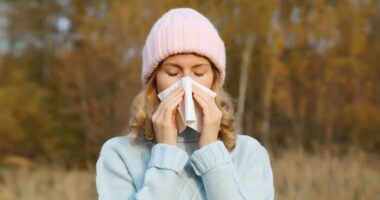Share this @internewscast.com
As cold and flu season sets in, many of us reach for vitamin C tablets, honey or lemon and ginger drinks, hoping to ‘boost’ our immune system.
Experts say diet can make a real difference— but it’s not as simple as consuming one magic food or taking a supplement.
Dr. Jenna Macciochi, an immunologist and popular author, states that about 70% of the immune system’s defenses reside in the gut. The strength of these defenses relies on a balance of nutrients rather than a single miracle solution.
‘Essential nutrients such as vitamins C, D, and A, along with minerals like zinc, iron, magnesium, and selenium, are crucial for proper immune function,’ she elaborates.
‘But no one nutrient works in isolation—it’s the balance between them that matters, and that comes from a healthy, varied diet.’
She adds that stress, lack of sleep, inactivity and alcohol can all weaken the immune system, undoing any benefits of supplements.
‘A strong immune system depends as much on lifestyle as it does on diet,’ she says.
Here the experts reveal the best foods to help you recover from a cold fast—and the ‘immune-boosting’ fads to skip this winter…

Dr. Jenna Macciochi is an immunologist focused on the connection between nutrition, movement, mind-body practices, and lifestyle with immune health and disease.
A glass of orange juice might stave off cold
For many, vitamin C supplements are the immediate choice when facing a cold, with some believing that large doses can fend off seasonal illnesses. However, experts caution that the reality is more complex.
Dr. Jenna Macciochi points out that for generally healthy individuals, vitamin C won’t necessarily prevent colds, although it might be beneficial once a cold has already started.
‘Consistent Vitamin C intake can slightly reduce the duration and severity if you do catch one,’ she explains.
Dietitian Dr. Ruxton recommends a daily glass of orange juice to enhance long-term immunity. Studies indicate that individuals meeting the recommended daily vitamin C intake recover from colds approximately eight percent quicker.
‘One small glass of 100 per cent orange juice provides more than 80 per cent of your daily recommended intake,’ she says.
Experts generally agree we should aim for at least 200mg of vitamin C a day for optimal immune function. Yet the average Brit only consumes around 70 to 80mg.
Other good sources include kiwis, red peppers, berries, grapefruit and leafy greens.

According to Dr Ruxton, vitamin A is essential for making natural killer cells and neutrophils which seek and kill invading bacteria
Dr Macciochi advises saving vitamin C supplements for when your immune system really needs the extra help—for instance, when you’re actually unwell. This is because fighting an infection increases the body’s demand for vitamin C.
Dr Ruxton adds: ‘If you have a cold, take a high-dose vitamin C supplement of 500 to 1,000mg daily, for about a week.’
A pot of yoghurt to give your system boost
Two nutrients that often get overlooked when it comes to immunity are vitamins D and A.
Professor Daniel Davis, an immunologist at Imperial College London, explains: ‘Vitamin A is vital for the development and functioning of many immune cells, and is crucial to our defences, playing a role in the body’s production of mucus, which helps eject germs during respiratory infections—like a runny nose.’
While vitamin A deficiency is rare in the UK, Dr Jenna Macciochi says eating a variety of fermented foods such as yoghurt, cheese, kefir and kimchi can help strengthen the gut—where around 70 per cent of the immune system resides—and in turn, reduce the risk of infection.
A recent study from Stanford School of Medicine found that people who added fermented foods to their diet for just ten weeks had a wider variety of microbes in their gut and calmer immune cells, meaning less inflammation in the body.
Researchers said this suggests fermented foods have an immune-boosting effect, helping to curb unwanted inflammation and support the body’s ability to fight infection.

Oily fish are naturally rich in vitamin D, though more than 1 in 5 Brits are clinically deficient in the so-called sunshine vitamin
According to the NHS, men need around 700mcg of vitamin A a day and women 600mcg—with a single serving of full-fat yoghurt providing roughly 250mcg.
Dr Macciochi adds that even small daily habits can make a difference: ‘A pot of yoghurt or a little fermented food each day can help maintain a balanced gut microbiome, which is the foundation of a resilient immune system.’
So while yoghurt might not stop you catching a cold altogether, it could help your body bounce back faster—and keep your defences in better shape through the winter.
Oily fish to help you beat the bugs
Vitamin D is another often-overlooked nutrient when it comes to fighting off winter colds—despite multiple studies showing an ‘indisputable link’ between the so-called sunshine vitamin and the immune system.
Dr Jenna Macciochi recommends following NHS guidance and taking a daily supplement throughout autumn and winter—meaning everyone should already have started.
Dr Carrie Ruxton explains why the vitamin is so vital: ‘Vitamin D boosts the immune system’s defences by stimulating antibacterial proteins and directing the foot soldiers of the immune system—the T cells.’
A lack of vitamin D can also raise the risk of respiratory infections. With nearly a third of Britons deficient during the colder months, Dr Ruxton advises eating more oily fish—such as salmon, mackerel and sardines—to help keep levels up.

Oysters are one of the richest dietary sources of zinc, which helps support the natural immunity we are born with
She adds: ‘Even people who get outdoors regularly struggle to make enough vitamin D from sunlight in the UK during winter, so a daily supplement and vitamin D-rich foods are really important.’
Other sources include eggs, fortified cereals and dairy products. But oily fish remains the best natural option—with a single portion of salmon providing more than half your daily requirement.
Dr Macciochi adds that maintaining steady vitamin D levels year-round can make a measurable difference: ‘People who are deficient are more prone to infections and take longer to recover.
‘Keeping levels topped up helps keep your immune system responsive when you need it most.’
Oysters help keep your defences strong
As one of the richest dietary sources of zinc, oysters can help build immunity and stave off a winter cold.
Zinc helps support the immune system by producing immune cells in response to exposure to new infections. The essential mineral also helps support innate immunity—the natural immunity we are born with.
Other good sources of zinc include seafood, poultry, red meat, legumes, nuts, seeds and eggs. But sometimes, our bodies need an added boost.

‘It’s a complete myth that lean, red meat is an unhealthy food,’ says Dr Ruxton
‘Studies show that a boost of zinc can help ward off cold symptoms, so take a zinc or multimineral supplement for a couple of weeks if you get the sniffles,’ Dr Ruxton advises.
According to the Department of Agriculture, just 100g of raw oysters contains an impressive 16.6mg of zinc, almost the daily recommended amount.
Even a slight shortfall in zinc can make it harder for the body to fend off viruses, particularly during the winter months when our immune systems are under strain.
Ensuring steady intake through food—or short-term supplements when you’re run down—can help keep your defences in check.
Put lean red meat on your winter menu
‘It’s a complete myth that lean, red meat is an unhealthy food—in fact it’s rich in protein, B vitamins, iron and zinc—all of which help support the immune system,’ Dr Ruxton said.
In particular, iron helps regulate the immune system, especially in the intestine, and is essential in making red blood cells which carry oxygen around the body.
But one in ten women are clinically deficient in the nutrient, leading to problems with immunity, brain fog and fatigue—which can make it harder to resist and fight infection.

Rhiannon Lambert is a Harley Street nutritionist and author of The Science of Nutrition
Other great sources of iron include beans such as red kidney beans, edamame beans and chickpeas, nuts, dried fruit, eggs and fortified breakfast cereals.
Including a mix of these foods helps ensure you’re getting both types of iron — the easily absorbed form from meat and the plant-based version, which is better absorbed when eaten with vitamin C-rich foods such as fruit or vegetables.
Getting enough iron year-round not only supports energy and concentration, but also helps your immune system stay resilient when seasonal bugs strike.
Should you really feed a cold and starve a fever?
Whilst the saying goes ‘feed a cold and starve a fever’, carrying a few extra pounds can actually increase the risk of infection, Prof Davis explains.
This is because excess fat can trigger inflammation in immune cells, which in turn increases the risk of disease, such as arthritis and heart disease.
To make matters worse, fat cells also produce cytokines which contribute to background inflammation in the body, dampening the immune system’s sensitivity to real threats.
However, Prof Davis warns, being underweight can be just as harmful to our immune systems because not eating enough food can lead to all sorts of nutrient deficiencies.
Rhiannon Lambert, a leading nutritionist and author of Learn How to Eat Well for Health and Happiness, added: ‘The reality is, whether you’ve got a cold, flu or fever, your immune system needs energy and nutrients to do its job, so eating and getting enough fluids has never been so important.
‘Even if you don’t have much of an appetite, you need energy to fight whatever it is that’s against you. You don’t have to eat as much as usual, but it’s important to choose nutritious foods to help your body function as optimally as possible.’













